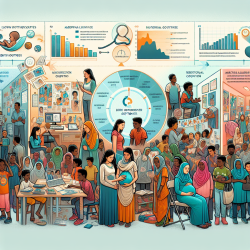Understanding Vulnerability in Disaster Contexts
In the realm of speech-language pathology, understanding the unique needs of vulnerable populations is crucial, especially in disaster settings. The research article "Studying Vulnerable Populations in the Context of Enhanced Vulnerability" provides valuable insights that can help practitioners improve their skills and contribute to better outcomes for children and other vulnerable groups.
The Importance of Research in Disaster Settings
Research in disaster settings is often met with ethical concerns, primarily due to the vulnerability of affected populations. However, the article emphasizes the necessity of such research to inform future actions and improve responses. It highlights how research can provide critical information on the physical and emotional needs of populations affected by disasters, thus enhancing the mental health management of victims.
Key Ethical Considerations
One of the primary ethical concerns is whether victims of a disaster are too vulnerable to participate in research. The article suggests that while vulnerability is a significant factor, it should not be a barrier to conducting research. Instead, practitioners must ensure that the rights and welfare of participants are protected through appropriate safeguards.
Applying Research Outcomes in Practice
Practitioners can apply the outcomes of this research by focusing on data-driven decisions that consider the unique vulnerabilities of populations in disaster settings. This involves:
- Understanding the layers of vulnerability, such as intrinsic factors (age, cognitive ability) and extrinsic factors (situational context).
- Implementing ethical guidelines that protect vulnerable subjects while allowing for valuable research to take place.
- Utilizing research findings to develop strategies that improve long-term survival and mental health management in disaster-affected populations.
Encouraging Further Research
The article also encourages further research to address gaps in understanding how best to manage vulnerabilities in disaster settings. Practitioners are urged to engage in studies that explore gender differences in vulnerability, the management of specific injuries, and the ethical implications of conducting research in these contexts.
Conclusion
For speech-language pathologists and other practitioners working with vulnerable populations, understanding the complexities of conducting research in disaster settings is essential. By implementing the outcomes of existing research and engaging in further studies, practitioners can enhance their skills and contribute to better outcomes for children and other vulnerable groups.
To read the original research paper, please follow this link: Studying Vulnerable Populations in the Context of Enhanced Vulnerability.










